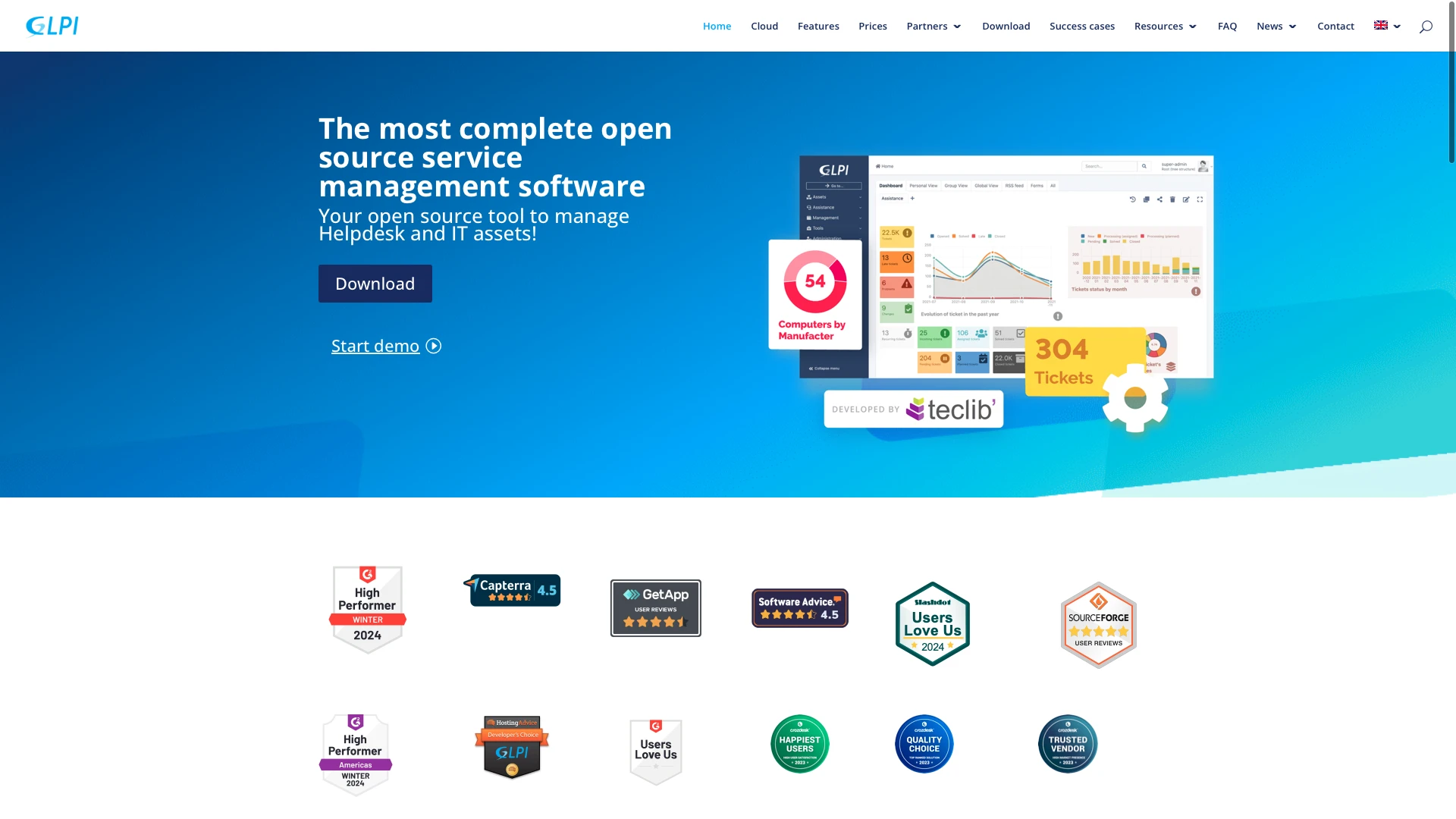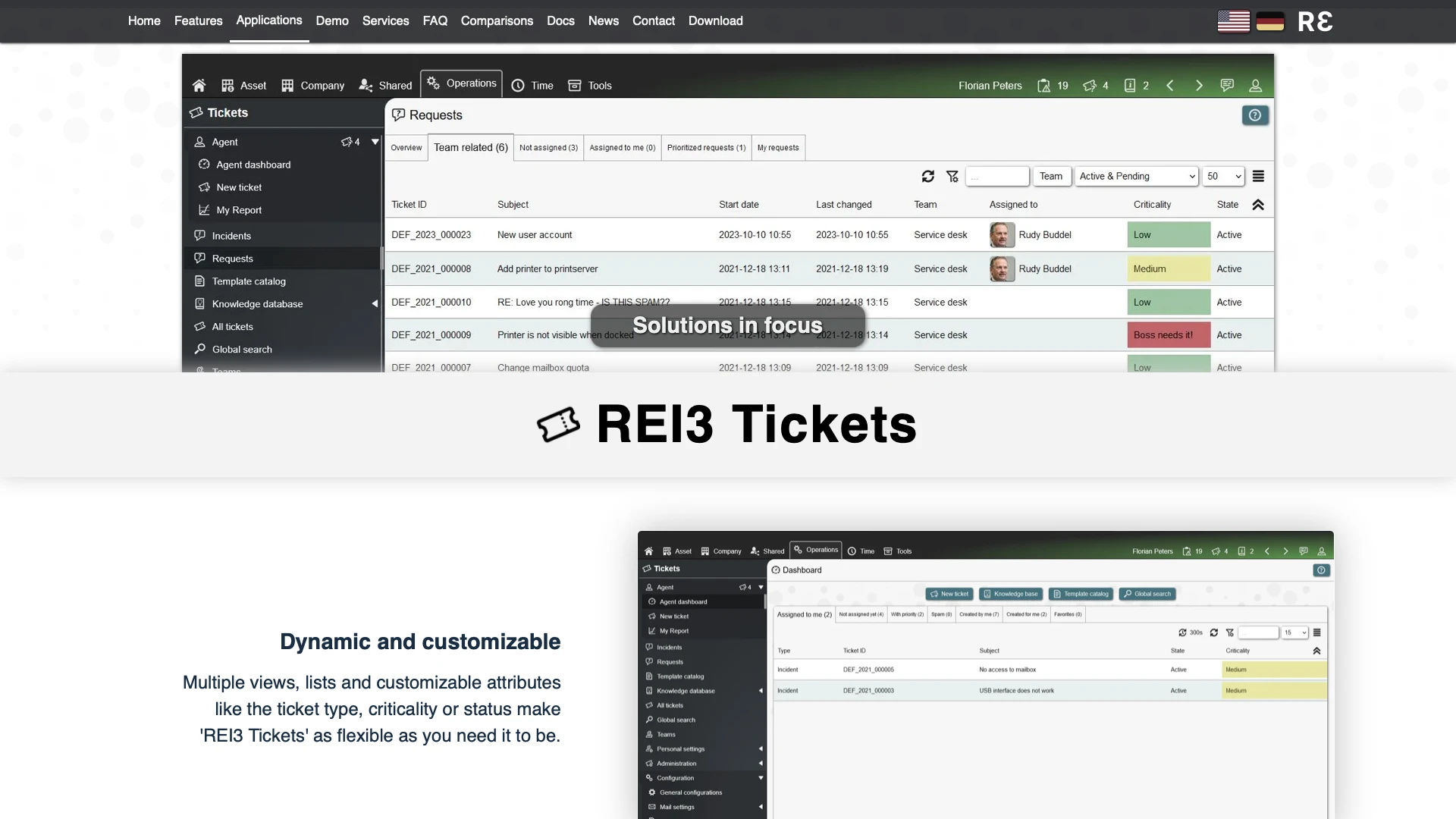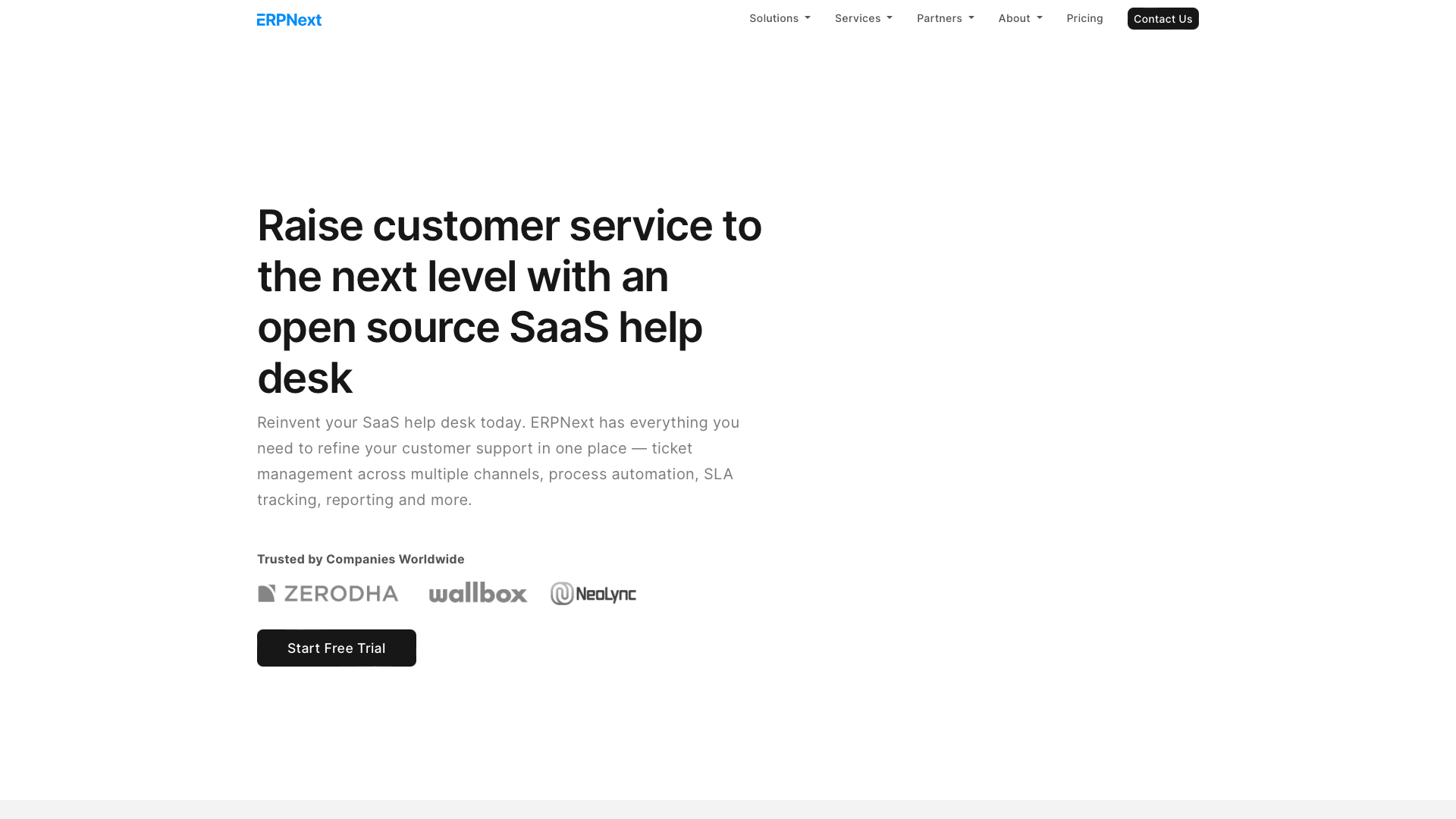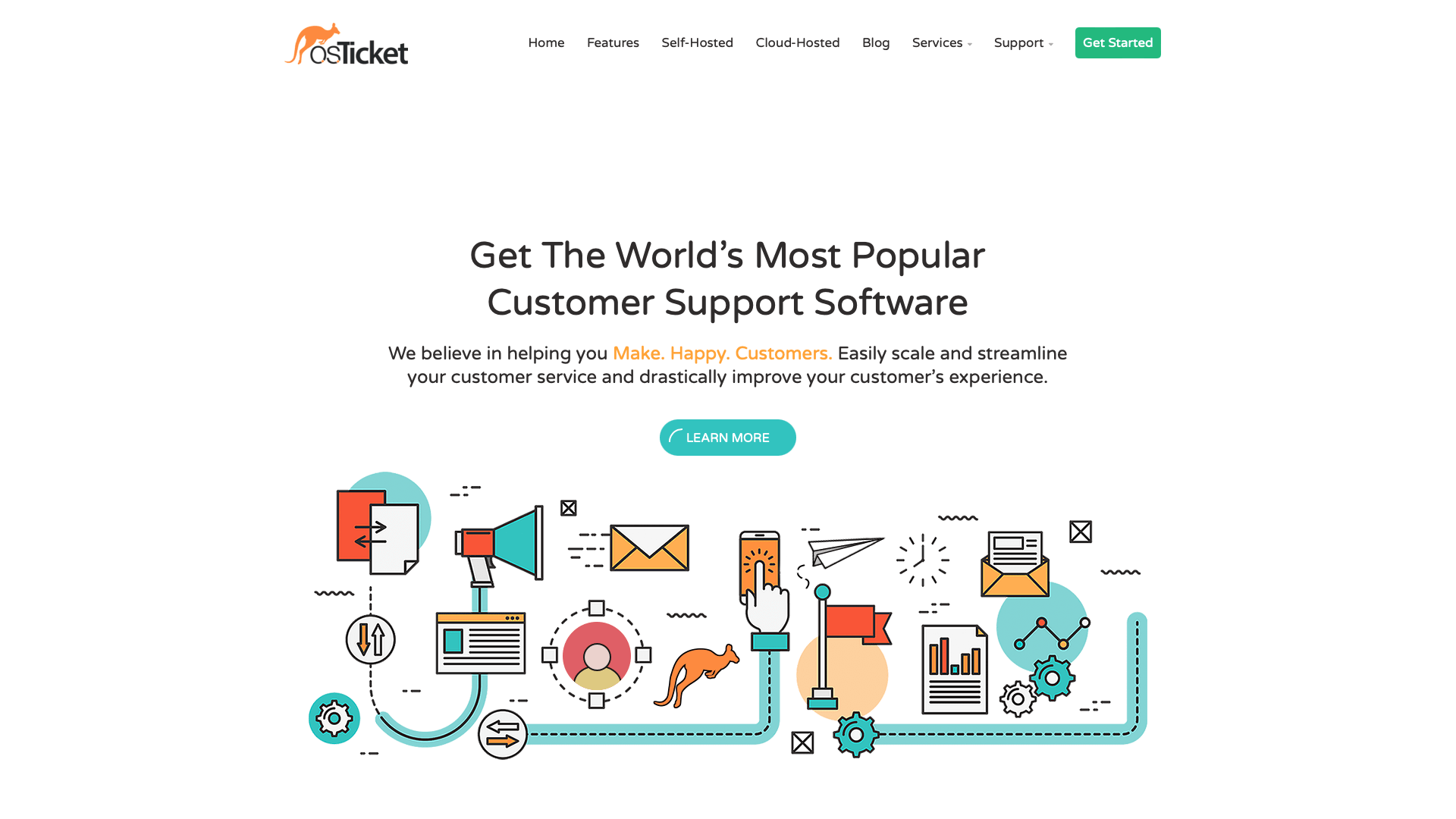Top 5 Open-Source Help Desk Software Tools
Help desk software is one of the most critical parts of your ITSM tool stack. Enabling employees and other users to access service quickly and easily has an enormous impact on your wider operational efficiency.
Today, we’re checking out some of the best options out there for open-source help desk software.
This can be a particularly tricky market to navigate. Many businesses prioritize open-source solutions for their help desk for security reasons. However, not all open-source tools offer the same level of capabilities as their COTS equivalents.
Therefore, we must carefully consider our options. Our goal today is to flag the top picks for open-source ticketing solutions, including their respective pros, cons, and ideal use cases.
We’re covering the following:
- What does help desk software do?
- Types of help desks
- Why opt for an open-source solution?
- Top 5 open-source help desks
By the end, you will be fully equipped to make an informed decision based on your own unique requirements.
Let’s start with the basics.
What does help desk software do?
Help desk software is used to administer access to internal services, like IT support, customer service, facilities management, HR, and more.
We’ll see some of these more granular use cases in more detail in a second. For now, we can break this down into a couple of key components.
Usually, this is centered around ticketing. So, we’ll have functionality for service users to submit request tickets. For instance, relating to a support query, issue, incident, or other request. Help desk teams can then view, categorize, action, and respond to these tickets.
Depending on the sophistication of your solution, many of the required tasks here, such as categorization, delegation, and scheduling, might be automated.
Most help desk solutions also provide additional functionality to improve resolution rates. For example, reporting on outcomes, furnishing agents with knowledge management, or providing self-service tools to enable users to resolve their own issues quickly and easily.
One critical aspect to this is providing different kinds of users with interfaces, tools, and data exposure that are appropriate to their needs within a given process. Typically, this takes the form of role-based access control.
Take a look at our guide to ITIL service request management to learn more.
Types of help desks
Let’s think in a bit more detail about some specific types of help desk software.
The example that will be most familiar to many of you will be IT service management. Most organizations over a certain size will provide an IT help desk for technical support, device rental, admin tasks, change requests, incident management, and other basic services.
Help desk software is also indispensable for operations and facility management teams. For example, handling scheduled servicing, maintenance requests, facility rentals, health and safety, and more.
HR, finance, and other teams often also provide services to colleagues via help desk and ticketing tools, especially around access to internal policies, submitting requests, managing personal information, handling complaints, and other key internal admin tasks.
Last but not least, we have external-facing helpdesk tools. These relate to key tasks for customers, partners, and other stakeholders - including access after-sales support, managing accounts, and handling issues.
With any of the above, we have the option of choosing an off-the-shelf, SaaS, or custom-built tool.
So…
Why opt for an open-source solution?
Open-source technologies are a priority for many businesses, potentially for a number of different reasons.
The most common, however, is security. The crux of this is the ability to audit and vet the source code of any platforms that will interact with mission-critical processes or internal data assets. This can make open-source tools preferable to their closed-source counterparts.
Depending on their internal procurement processes, large organizations may be able to adopt open-source tools more quickly without necessarily needing to go through the same financial and legal approval processes as they would with commercial vendors.
Some teams also opt for open-source solutions to decrease reliance on the vendor for maintaining software. For instance, if they need to make modifications to the source code or maintain a solution themselves when a vendor ceases to operate.
However, it’s important to note that not all open-source vendors allow this, and what we can do with a particular piece of software depends on the license that it’s offered under.
Top 5 open-source help desks
Now that we have a firm grasp of what we’re looking for when it comes to open-source help desk software, it’s time to see how specific platforms stack up against one another.
We’ve chosen an assortment of platforms, each targeting distinct use cases and corners of the market. Along the way, we’ll flag some of the key selling points and potential issues relating to each.
Our top picks are:
Let’s jump in.
1. Budibase
First up, we have Budibase, the open-source, low-code platform that empowers IT teams to turn data into action. Systems architects, solutions architects, data professionals, and other IT colleagues choose Budibase to ship professional tools quickly, with minimal custom code.
With autogenerated screens, flexible RBAC, free SSO, and optional self-hosting, Budibase is the ideal solution for creating all sorts of ticketing and help desk solutions. We’ve recently launched a range of new AI capabilties, including custom configs to allow you to connect to the LLM of your choice - opening the door to a huge range of autocategorization and ticket triaging workflows.
Check out our guide to building an IT portal to learn how to create a tool like the one above.
Features
Budibase offers unrivaled connectivity for existing databases. Our platform acts as a proxy, directly querying RDBMSs, NoSQL tools, REST APIs, Google Sheets, and more without storing the retrieved data. We also offer our own built-in, low-code database.
Building UIs in Budibase is a breeze, with a vast library of configurable components, autogenerated forms and CRUD UIs, custom conditionality rules, and extensive optional customization with CSS and JavaScript.
Budibase also offers cloud deployments, optional self-hosting, free SSO, custom branding, role-based access control, and much more, with some of the most generous pricing in the low-code space.
Use cases
Our platform is the ideal solution for creating custom ticketing and help desk software in minutes. IT teams use Budibase to build all kinds of forms, approval apps, workflow tools, knowledge bases, and resource management solutions.
Budibase makes it easier than ever to build tools for managing critical business data. We offer spreadsheet-like interactions and autogenerated UIs for SQL and internal tables. You can also implement RBAC at the level of screens, components, data sources, or individual queries.
Use Budibase to fully streamline internal help desk workflows. Our flow-chart-based automation editor offers powerful rules, including looping, integrations, and conditional logic, with totally optional custom code.
Pricing
Budibase empowers you to build unlimited applications for up to five users in the cloud or twenty users if you self-host. Beyond this, our paid tier bills at $50 per month for creators and $5 for end users, complete with custom branding, reusable code snippets, and more.
Alongside our self-hosted, open-source product, Budibase pricing is designed to scale as your needs grow and change. We also believe that businesses of all sizes should be able to use our product without compromising on security, so we offer SSO and extensive data support across all tiers.
Custom enterprise licenses are also available, with enhanced security, enforceable SSO, creator RBAC, air-gapped deployments, priority support, SLAs, and more. Check out our pricing page to learn more.
Start building with our free ticketing system template
Sign up now2. GLPI

Next up, we have GLPI. This is a ready-to-deploy suite of open-source help desk and ticketing tools trusted by a huge number of large enterprises and other household brands.
It’s a good option for teams that want an ITSM solution that they can roll out immediately, complete with asset management, ticketing, finance tools, and more.
Pros
The big selling point with GLPI is how quickly and easily it can be deployed as a fully working solution. All that’s required for installation is a PHP web server and a MySQL or MariaDB database.
Post-installation, we can begin rolling out a range of highly workable tools. We’re particularly impressed by GLPI’s ticketing platform, which includes problem and change management, recurring tickets, custom forms, and flexible planning and reporting tools.
GLPI is also very strong for administrative and governance capabilities. There are eight distinct user roles with two separate end-user interfaces, making it a very attractive option for organizations with complex internal service processes.
Cons
One big point of detraction is GLPI’s data support. We need to use MySQL or MariaDB for installation, which could cause a headache if relevant existing data is currently stored in other tools like Postgresql or SQL Server.
GLPI also falls down somewhat on integration options. While there’s a powerful platform API and a range of community-contributed plug-ins, our options for native integrations are somewhat more limited - especially when it comes to external databases.
Finally, GLPI bills with minimum user volumes, meaning that it could be prohibitively expensive for smaller teams or use cases that require scalability.
Pricing
Unlike many open-source tools, GLPI doesn’t offer a fully-functioning free tier. Instead, there’s only a free trial of their cloud-based platform. Naturally, this will make it a less attractive option for certain teams.
On top of this, per-user costs are relatively high. The cloud platform bills at €19 per agent per month. On-premises deployments come with minimum user commitments, starting from €100 per month for 10 users and up to 500 assets.
For larger-scale deployments or more advanced functionality, we’ll need to upgrade to a more expensive self-hosted tier, meaning that GLPI could potentially be difficult to scale as our usage increases.
3. REI3 Tickets

Our next open-source help desk software tool is REI3 Tickets. As the name suggests, this is a dedicated ticket management solution offered as part of the wider REI3 low-code platform.
This is a flexible, cost-effective solution for handling internal ticketing, although it may lack the flexibility of some more modern or advanced alternatives.
Pros
REI3 Tickets is a flexible visual development tool for creating custom ticketing solutions for a range of use cases, including HR, IT, customer service, and more. We can easily create a data model and interfaces for handling tickets without much development skill.
On top of this, REI3 Tickets offers some more advanced features, including automatic categorizations, email automations, notifications, and more.
Helpfully, REI3 also offers a range of ticket templates, making it easy for us to get up and running with common use cases.
Cons
The biggest point with REI3 is that compared to other tools in the low-code space, developer experiences feel a little bit dated. The UI builder itself and the end-user interfaces leave a lot to be desired compared to more modern platforms like Budibase.
REI3 Tickets ships with an internal PostgreSQL database. This is great for scalability, reliability, and familiar management experiences. However, support for other databases is lacking, and we’ll probably need to look elsewhere to build on other DBMSs.
Notably, REI3 must be self-hosted, with no cloud-based version of the product on offer.
Pricing
REI3 Tickets is totally free to use commercially, with no limits on stored data, applications, or concurrent users. This could make it a very attractive option for teams that want to manage wide-scale operations on a budget.
There are paid plans, but these primarily introduce SLAs and support, as well as some additional enterprise features like corporate identity management and directory services.
Paid plans are billed on a per-user basis, with licenses costing between €2.50 and €5 per user per month, depending on your specific volumes.
4. ERPNext

ERPNext is a popular open-source enterprise resource management platform that ships with highly flexible, modern help desk and knowledge base tools.
It’s available as a cloud solution or a fully self-hosted platform under a GLPv3 license.
Pros
Of the free, ready-made platforms we’ve seen so far, ERPNext is probably the most modern offering. The help desk tools offer extensive functionality, including issue reporting, SLA tracking, process automation, and multi-channel support, straight out of the box.
One aspect of this that we’re particularly impressed by is the capabilities around automatically assigning tickets. We can create custom rules using visual expressions based on load-balancing or round-robin systems.
ERPNext’s ticketing system also provides a sleek, attractive customer portal. Service users can access the latest updates and correspondence relating to their issues, helping to save on agent resources.
Cons
One common complaint with ERPNext relates to the installation process. Recommended installations use Frappe Bench, requiring some familiarity with Linux/Unix systems.
ERPNext also offers less configurability than some competitors when it comes to managing your help desk’s data layer. The internal database uses MariaDB. This offers extensive scalability and performance, but we can’t easily use an alternative database.
Some users also complain that ERPNext lacks flexibility, especially compared to COTS ERP tools or low-code development solutions.
Pricing
ERPNext offers a fully open-source free product with no usage limitations. Of course, this means it has the potential to be a very cost-effective option if you have the internal technical resources to deploy and manage it.
For teams that want to use ERPNext in the cloud, paid plans start from $50 per month. This offers unlimited users, but ERPNext says that it’s best for teams with around 50 employees. We’ll also get a product warranty as part of our license.
Custom enterprise pricing is available, too, complete with priority support and account management.
5. osTicket

Lastly, we have osTicket. This is an open-source help desk and ticketing system that’s highly optimized for external-facing tasks, including customer support and aftersales.
It’s also one of the most popular and mature solutions we’ve seen, with over 5 million global users across a wide range of industries.
Pros
osTicket offers some impressive capabilities aimed at improving resolution rates and coordination within large help desk teams. For instance, internal agent to-do lists, custom data views, and agent collision avoidance.
Users rate osTicket highly for usability, making it easy to create custom solutions, including help desk management and customer self-service portals.
It’s also a relatively flexible platform. We can create custom data schemas for individual tickets and help topics, as well as using submitted data to populate dynamic automatic responses.
Cons
Compared to some other platforms, users complain that installing osTicket can be relatively difficult, requiring some knowledge of PHP, web servers, and MySQL. However, it’s worth noting a commercial cloud version of the platform is also available.
osTicket also lags behind some other platforms in terms of integration options. For the most part, if we want to connect to external tools, we’ll need to configure this ourselves using the platform API or ODBC connections.
Some users also find osTickets slightly inflexible when it comes to analytics and reporting, especially when creating and visualizing custom performance metrics.
Pricing
OsTicket is available as three different platforms. The fully open-source solution is free, including unlimited users. However, this is limited to community support, and we’ll need to host it ourselves.
The commercial equivalent is sold under the name ServiceSystem. This is available as a cloud-based product for $12 per agent per month. This also includes additional support alongside hosting.
Custom pricing is available to deploy SupportSystem to virtual appliances, including help with customizing solutions to meet your specific internal requirements.
Turn data into action with Budibase
Budibase is the ideal solution for building custom ITSM tools on top of any data source. Busy IT teams choose our open-source, low-code platform to ship professional solutions in a fraction of the time.
With optional self-hosting, scalable pricing, advanced workflow automations, autogenerated screens, flexible RBAC, free SSO, and much more, Budibase is the smart choice for building ticketing systems, internal portals, knowledge bases, and other workflow tools.
Check out our product page to learn more.